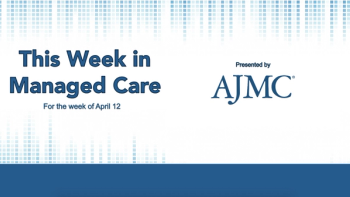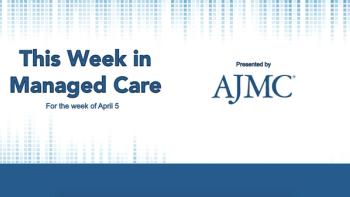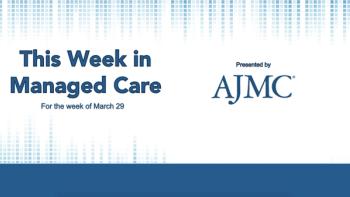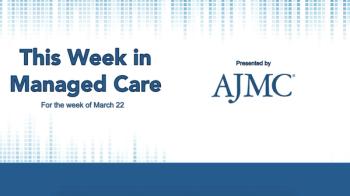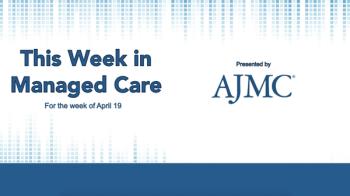
This Week in Managed Care: December 4, 2020
This week in managed care, the top news included assessing how potential coronavirus disease 2019 (COVID-19) vaccines compare; examining the link between COVID-19 and diabetes; study finds women at greater risk for heart failure after a heart attack.
Assessing how potential COVID-19 vaccines compare, Managed Care Cast examines the link between COVID-19 and diabetes, and a study finds women at greater risk for heart failure after a heart attack compared with men.
Welcome to This Week in Managed Care, I’m Matthew Gavidia.
How Do Potential COVID-19 Vaccines Compare?
In the span of a few weeks, Pfizer, Moderna, and AstraZeneca all announced positive results from their respective COVID-19 vaccine trials. To receive approval, the FDA requires coronavirus vaccines be at least 50% effective. However, each vaccine is distinct when it comes to efficacy, storage, dosing, and production.
As the first companies to announce results of their phase 3 trial, Pfizer and BioNTech’s vaccine candidate
The vaccine, BNT162b2, contains messenger RNA, or mRNA, which is thought to provoke the immune system to fight the virus, but requires a storage temperature of –94° Fahrenheit. This could lead to logistical concerns during distribution as most doctors’ offices do not have freezers that go that low.
To help mitigate these concerns, Pfizer developed specially designed temperature-controlled shippers, which can maintain storage conditions for up to 15 days. After being thawed, the vaccine vial can be stored for up to 5 days in normal refrigerated conditions of up to 46.4° F.
Similar to Pfizer’s vaccine in that it also includes mRNA, Moderna’s mRNA-1273 was reported in the phase 3 COVE study to be 94.5% effective against the virus. However, Moderna’s vaccine differs significantly from Pfizer’s in that it can be stored in temperatures equal to most home or medical freezers for up to 6 months.
Should the vaccine gain approval, Moderna estimates it will have approximately 20 million doses ready to ship in the United States by the end of 2020. And in 2021, the company hopes to manufacture between 500 million and 1 billion doses globally.
The FDA is set to meet on December 10 and 17 to discuss approving the Pfizer/BioNTech and Moderna vaccines for use in the United States, with the first potential doses to be distributed to health workers, followed by vulnerable populations 65 years and older or with medical conditions and essential workers.
For more,
Database Helps Clinicians Determine Whether COVID-19 Causes Diabetes
In this week’s Managed Care Cast, Dr Francesco Rubino, a professor of metabolic and bariatric surgery at King’s College London, discusses the potential bidirectional relationship between COVID-19 and diabetes.
Although diabetes is an established risk factor for more severe cases of COVID-19, recently reported cases have found COVID-19-related diabetes among those with no preexisting risk factors.
Interested in these rare cases, which don’t appear to fit the typical 2 types of diabetes, Rubino, along with a cohort of clinicians from around the world, devised a global registry of COVID-19-related diabetes to better track and understand this condition.
The resulting CoviDiab Registry serves to establish the extent and characteristics of this new-onset, COVID-19-related diabetes and to investigate its pathogenesis, management, and outcomes.
For the full interview,
Risk for Heart Failure Higher in Women vs Men After a Heart Attack
This week, study findings published in the journal Circulation indicate that the 5-year risk of women dying or developing heart failure following a first severe heart attack is 20% higher compared with men.
The population-based cohort study examined 45,064 patients admitted to a hospital in Alberta, Canada, between April 1, 2002, and March 31, 2016, who had a first heart attack of 1 of 2 types that required hospitalization:
- ST-segment elevation myocardial infarction, or STEMI, a life-threatening heart attack, was reported in 45.1% of participants
- Non–STEMI, a less severe and more common heart attack, was reported in the remaining population
Although older and subject to more comorbidities, results show that 74% of the female study population had a diagnostic angiography vs 87% of men. Women were additionally found to be seen 15.4% less often by a cardiovascular specialist compared with men.
Overall, in the aftermath of a hospital discharge, heart failure was the more likely ultimate outcome in women compared with men after both a STEMI and a non–STEMl.
Clinicians need to recognize that there are gaps in care between women and men, be aware of possible biases, and be more attuned to their highest-risk patients to provide better care, said Dr Padma Kaul, one of the study’s coauthors, in a statement. Future studies also should investigate the levels of care that all patients with cardiac issues are receiving, as well as identify possible oversights and how to surmount them, the authors stated.
For more,
African American Men Face Higher Risk of Aggressive Prostate Cancer, but Not Necessarily Death
Recently published in JAMA, a new study suggests that while African American men may face a greater incidence of prostate cancer progression and definitive treatment, those increases do not translate to an increased risk of metastasis or death.
Although most cases of prostate cancer are considered low risk and are dealt with through active surveillance rather than immediate treatment, the researchers wrote that there is concern within the oncology community that African American men may face a sufficiently higher risk of progression that would render them poor candidates for active surveillance.
In an effort to calculate the potential risk, they conducted a retrospective cohort study of men in the US Veterans Health Administration, or VHA, Health Care System who received a diagnosis of low-risk prostate cancer between 2001 and 2015.
In their findings, African American men were more likely to have progression and definitive treatment; however, rates of metastasis, prostate cancer-specific mortality, and all-cause mortality were similar among African Americans and non-Hispanic whites.
This new data, believed to be the largest sample of African American participants in an active surveillance study of men with prostate cancer, suggests that careful active surveillance may be an effective option for African Americans.
Still, in an editorial published along with the study, authors cautioned that the particular patient population in the study had equal access to care due to their status as veterans entitled to receive care through the VHA. That kind of health equity is not replicated outside of the veterans population, they noted.
For more,
Paper of the Week
And now, our paper of the week, which looks back at some of the most important papers over the past 25 years of The American Journal of Managed Care® and why they matter today.
Frequently used to treat patients with cancer, oral anticancer medications, or OAMs, are covered by prescription drug plans, but researchers of this week’s 2018 paper sought to examine whether barriers inhibited initiation of these therapies in patients with prostate or kidney cancer.
The paper, “provider and patient burdens of obtaining oral anticancer medications,” found that 73% of all prescriptions required 2 or more phone calls by clinic staff, with 40% requiring 5 or more calls.
“These early observations suggest that a more efficient process for initiation of OAMs is needed,” concluded the study authors.
For the paper,
For all of us at AJMC®, I’m Matthew Gavidia. Thanks for joining us!
Newsletter
Stay ahead of policy, cost, and value—subscribe to AJMC for expert insights at the intersection of clinical care and health economics.
